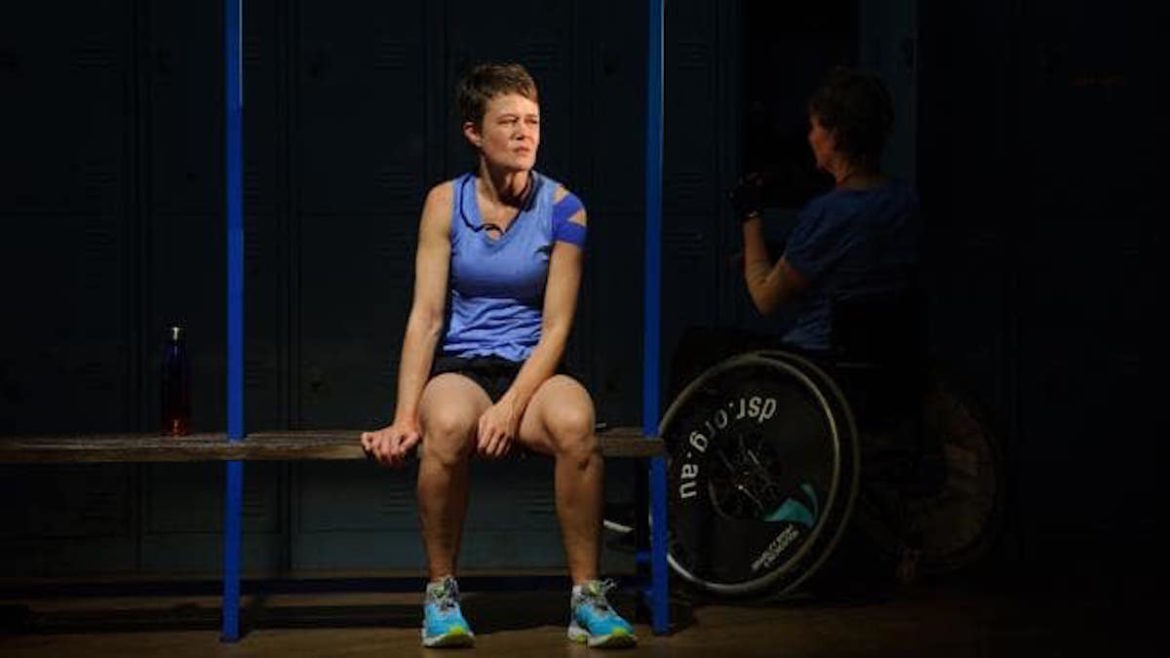Robert Reid reviews Emilie Collyer’s Contest, an epic examination of relationships between women
In Contest, now on at Darebin Arts Speakeasy, the world created by writer Emilie Collyer and director Prue Clark is remarkable: an epic battle worthy of Homer that spills out of, and perfectly captures, formalised physical contest.
The Main Hall of Northcote Town Hall is transformed into a netball court, its wooden floor taped up with red court lines, lockers installed at the end of the room. Beyond the lighting rig, the roof and massive art deco lamps loom in shadow. We are here to watch a deadly serious game, a world transformed through play.
In the flow of play the players are lost to the world, and afterwards, for them, the world is different. The game expresses the fight to survive, to be who we are, to be sick when we are sick or weak when we feel weak, to refuse to conform to the ideals of others. The players pass through the game, which in its flashes of spotlight and shouting of urgent directives seems more like a battlefield than a netball court, into a surreal post-play landscape, with floods of ground-hugging fog and floral head dresses. They pass through their individual trials and walk together into the light across a battlefield fallen silent.
The court, designed by Romanie Harper and lit by Amelia Lever-Davidson, speaks throughout. Lights shift around it, locker doors open and close of their own accord or shoot sparks as the banal realities before the game slip into a different reality.
As a side note, I’ve seen a lots of stuff shows staged in the traverse lately – this might be the fifth. Are our theatre makers subconsciously asking us to look at ourselves? Are we asked to look at the kind of people who come to see theatre? Something’s clearly in the air.
It begins with three women named for the positions they play, which become archetypal. The Centre (Alice Ansara), Goal Defence (Kate Hood) and Goal Shooter (Sonya Suares), prepare for the game to come. Their training session about to begin, they discuss a new team member with the Goal Attack (Natasha Herbert) who arrives late, changing into her uniform straight from work.
In the following scene, the new player, Wing Attack (Emily Tomlins-Cass) approaches from the distant ranks of a seating bank on the other side of the hall from the change room. She emerges from empty seating, and makes the long journey across the court. The Wing Attack tells the audience about herself, her path toward joining the team. The walls between the play and the world are indistinct here: the real world hovers around the productions edges, not so much Brechtian signs as Jungian traces, as the light spills from the stage into the shadowlands between.
The five women talk as they warm up, as they train, as they play. They communicate constantly, as a good team is supposed to. There are some misfires early on: Goal Shooter invites Goal Defence to speak at her school about her life in a wheelchair and is quickly rebuffed. Goal Defence will not be anybody’s inspiration story. Likewise, Goal Attack has little patience for Wing Attack’s depression. These early faux pas are reflections of the characters’ insecurities and prejudices, causing unintentional fouls while they get to know each other, but by the end they are a battle-hardened platoon. Contest begins as a metaphor for how women bond and work together, but it travels a great distance over the course of the game to reach operatic dimensions.
The team shifts through the games of preparation – warmup, training, social positioning – into the game itself. As they work, their conversation ranges over their families, their work, their troubles, their reasons for playing, their opinions of the others in the team. The choreography (Nat Cursio and Alice Dixon) turns warmup exercises, stretches and drills into a ritual, a dance that that occupies them while the real work of bonding, talking and testing each other goes on. Their opinions of each other are shaped and changed by their interactions on and off the court and they grow together, learning to trust and support each other in the heat of play.
Between the cracks of their conversation, the huge things fall through. One is caring for her dying mother. Another is terrified of her husband. Each woman is fighting her own battle and netball becomes a kind of meditation, a way to rise above, lift out and turn down the volume on the shit.
The women themselves disappear as they play. As the court transforms into a battle ground they become their own archetypes, warriors and gods. In the final image – the women walking, crowned with leaves and gold, into the golden light – they might be the sons of Ulster marching towards the Somme.
Contest, by Emilie Collyer. Directed by Prue Clark. Set and Costume Design, Romanie Harper. Lighting Design, Amelia Lever-Davidson. Movement direction by Nat Cursio and Alice Dixon, sound design by Emah Fox. Performed by Alice Ansara, Natasha Herbert, Kate Hood, Sonya Suares and Emily Tomlins. Darebin Arts Speakeasy until August 4. Bookings
Darebin Arts accepts Companion Cards. Please call the Box Office on 9481 9500 to make your booking.

